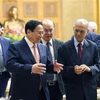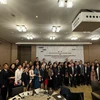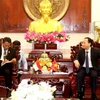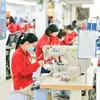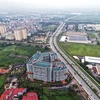The local market will be opened after Vietnam is officially admitted into the Trans-Pacific Partnership (TPP), Tran Quoc Khanh, Deputy Minister of Industry and Trade, told Tuoi tre (Youth) newspaper.
* Recently, some people have expressed anxiety about problems that might arise when Vietnam is admitted to the TPP. As the head of the negotiating team, what do you think about the "gains" and "losses" Vietnam will face when it becomes a full member of the TPP?
When participating in any trade agreement, all countries have to think of how to balance their rights and obligations, or find the balance between the "gains" and "losses". That's only a rough concept.
In reality, sometimes what we think of as a "loss", turns out to be a "gain". For example, the loss of a company, or even of a whole sector, becomes a "gain" for the national economy.
That's why, before deciding which scenarios we'll use during negotiations, the government always come up with an overall assessment. So, by now the government's plan is the guiding star for us to follow.
* Did we really make concessions during the negotiations on garment textile exports by accepting reforms for State owned enterprises (SOEs)?
During the negotiations, we strictly followed the government's plan and paid special attention to the overall balance. That means we didn't have to go into small details to accept the SOEs reforms, in exchange for "textile" exports or "beef" for "leather shoes".
* The current SOEs restructuring process is taking place very slowly. Do you think that it will impede the negotiating process?
No, I don't think so. The TPP does not require us to eliminate or equitise the SOEs. The agreement accepts the right of each member country to have their SOEs.
However, the agreement requires that the SOEs must follow the "rules of the game" when they compete in the market with enterprises from other economic sectors. This is the basic orientation guiding the SOEs reform in our country.
* What will happen to the issue of government procurement when a level playing field is applied to all enterprises, be them Vietnamese, joint ventures or foreign enterprises?
Three criteria are required when the government procurement market is to open to all entities. First, which government agency has to open international bidding during their procurements.
Second, the value of packages that require international bidding. And finally, what kinds of commodities or services will require international bidding.
Though the negotiations have not yet been concluded, the three criteria mentioned above are an indication that not all government procurements have to open to international bidding - for example, procurements for national security or defence. In addition, this is the first time Vietnam opens the government procurement market to the outside world.
So during the negotiation, we will ask for a delay in the implementation to help Vietnamese enterprises have time to prepare and adjust to the new environment.
* Which technical barriers, including the "economic needs test", will be lifted when Vietnam becomes a TPP member?
Sorry, I can't answer this question as the negotiation is still going on. But all I can say now is that it depends on the overall balance.
Of course, we will give priority to the rights of Vietnamese enterprises and more employment to our working people. And especially the legitimate rights of Vietnamese consumers to have access to the good and civilised distribution service.
* In the past, the principle of a fair playing field was a guiding principle during the negotiations. But by now, the developed countries have made concessions on this point. What was the reason leading to such a big change by developed nations?
All leaders of TPP members have accepted the diversity of different levels within the bloc. This is the foundation for developing countries, particularly Vietnam, to come up with a proposal to have a road map to implement some of its commitments.
Whether the road map will be utilised to its best or not, it all depends on us. If we are pro-active, the road map will become a good "buffer zone", helping us to adjust to the new environment and requirements.
However, if we are in a "passive position", the road map will be null and void. Lessons from the past have shown that if the road map covers a long period of time, sometimes it will have an adverse effect. As in such a situation, people often think "we still have plenty of time". When the implementation time comes, people are in a hurry. But it is too late!
* How do you evaluate the successful level of the most recent round of negotiations?
The last round of negotiations in Bali, Indonesia, were the negotiations between 12 ministers. Vu Huy Hoang, Minister of Industry and Trade, was among the participants. The meeting lasted three days and it ended successfully.
I must admit that the negotiations between the ministers were very tough and frank. They touched upon very small details.
However, the three day meeting has helped them further understand each other. They agreed to meet each other some time later this month. I pin my hopes on the upcoming ministerial meeting of the 12 ministers also being a success.-VNA
* Recently, some people have expressed anxiety about problems that might arise when Vietnam is admitted to the TPP. As the head of the negotiating team, what do you think about the "gains" and "losses" Vietnam will face when it becomes a full member of the TPP?
When participating in any trade agreement, all countries have to think of how to balance their rights and obligations, or find the balance between the "gains" and "losses". That's only a rough concept.
In reality, sometimes what we think of as a "loss", turns out to be a "gain". For example, the loss of a company, or even of a whole sector, becomes a "gain" for the national economy.
That's why, before deciding which scenarios we'll use during negotiations, the government always come up with an overall assessment. So, by now the government's plan is the guiding star for us to follow.
* Did we really make concessions during the negotiations on garment textile exports by accepting reforms for State owned enterprises (SOEs)?
During the negotiations, we strictly followed the government's plan and paid special attention to the overall balance. That means we didn't have to go into small details to accept the SOEs reforms, in exchange for "textile" exports or "beef" for "leather shoes".
* The current SOEs restructuring process is taking place very slowly. Do you think that it will impede the negotiating process?
No, I don't think so. The TPP does not require us to eliminate or equitise the SOEs. The agreement accepts the right of each member country to have their SOEs.
However, the agreement requires that the SOEs must follow the "rules of the game" when they compete in the market with enterprises from other economic sectors. This is the basic orientation guiding the SOEs reform in our country.
* What will happen to the issue of government procurement when a level playing field is applied to all enterprises, be them Vietnamese, joint ventures or foreign enterprises?
Three criteria are required when the government procurement market is to open to all entities. First, which government agency has to open international bidding during their procurements.
Second, the value of packages that require international bidding. And finally, what kinds of commodities or services will require international bidding.
Though the negotiations have not yet been concluded, the three criteria mentioned above are an indication that not all government procurements have to open to international bidding - for example, procurements for national security or defence. In addition, this is the first time Vietnam opens the government procurement market to the outside world.
So during the negotiation, we will ask for a delay in the implementation to help Vietnamese enterprises have time to prepare and adjust to the new environment.
* Which technical barriers, including the "economic needs test", will be lifted when Vietnam becomes a TPP member?
Sorry, I can't answer this question as the negotiation is still going on. But all I can say now is that it depends on the overall balance.
Of course, we will give priority to the rights of Vietnamese enterprises and more employment to our working people. And especially the legitimate rights of Vietnamese consumers to have access to the good and civilised distribution service.
* In the past, the principle of a fair playing field was a guiding principle during the negotiations. But by now, the developed countries have made concessions on this point. What was the reason leading to such a big change by developed nations?
All leaders of TPP members have accepted the diversity of different levels within the bloc. This is the foundation for developing countries, particularly Vietnam, to come up with a proposal to have a road map to implement some of its commitments.
Whether the road map will be utilised to its best or not, it all depends on us. If we are pro-active, the road map will become a good "buffer zone", helping us to adjust to the new environment and requirements.
However, if we are in a "passive position", the road map will be null and void. Lessons from the past have shown that if the road map covers a long period of time, sometimes it will have an adverse effect. As in such a situation, people often think "we still have plenty of time". When the implementation time comes, people are in a hurry. But it is too late!
* How do you evaluate the successful level of the most recent round of negotiations?
The last round of negotiations in Bali, Indonesia, were the negotiations between 12 ministers. Vu Huy Hoang, Minister of Industry and Trade, was among the participants. The meeting lasted three days and it ended successfully.
I must admit that the negotiations between the ministers were very tough and frank. They touched upon very small details.
However, the three day meeting has helped them further understand each other. They agreed to meet each other some time later this month. I pin my hopes on the upcoming ministerial meeting of the 12 ministers also being a success.-VNA
